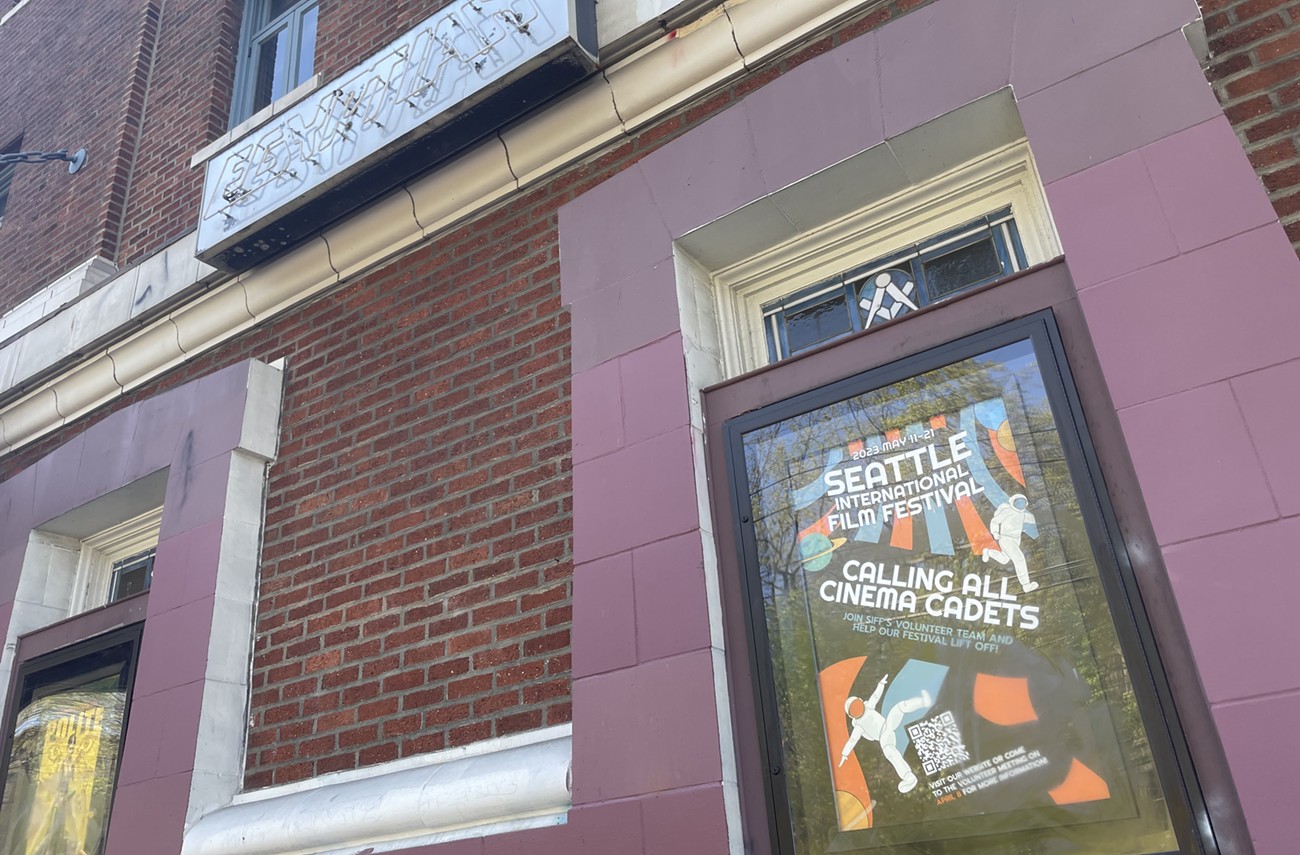As the Seattle International Film Festival (SIFF) kicks off today, the festival’s workers are fighting for a fair union contract.
SIFF’s year-round, part-time employees voted to unionize in March, and they say their working conditions haven’t improved since their walkout during the festival last year. But despite their concerns, they remain hopeful that a unionized SIFF can emerge stronger and lead a new post-pandemic film boom in the Pacific Northwest.
It's been a bumpy past few years for SIFF, which holds an annual film festival, operates two theaters year-round, and hosts programming at the SIFF Film Center in Lower Queen Anne. The nonprofit’s staff consists of salaried office workers who handle efforts such as marketing and fundraising, and also part-time “cinema staffers” who work the theaters. Those employees make around the city’s minimum wage and say they supplement their income by juggling a variety of side-gigs.
At the beginning of the COVID pandemic, cinema staffers said they were angry when they were abruptly laid off during a brief mid-March 2020 Zoom call and told they wouldn’t be paid sick leave, vacation pay, or wages for their already-scheduled shifts. SIFF leadership claims they did pay out accrued vacation hours.
“We were told we were being let go, and if we had any questions or needed any resources we could reach out to the executive director, and we’d be kept in mind for when they reopened,” said Tony Ochoa, a cinema lead who’s been with SIFF since 2019.
A nearly $600,000 Paycheck Protection Program loan kept the organization afloat, and the feds ultimately forgave $492,000 of it. On its PPP loan application, SIFF reported it had 164 employees. SIFF leadership claims they used the money to support 10 “administrative, programming, and fundraising staff.”
All the other workers collected unemployment and waited to hear from SIFF. And waited.
Those workers claim SIFF didn’t offer them roles in running its April 2021 virtual-only festival, or even notify them of those roles in the first place. When the workers sent an email on behalf of all the year-round workers asking for more transparency on this issue, signed “SIFF Cinema Staff,” they got what they felt was a dismissive response. In the email, Ochoa said, SIFF basically said it didn't respond to anonymous emails but encouraged workers to reach out one-on-one.
SIFF leadership says, “As the pandemic continued and operations were able to gradually expand closer to pre-pandemic services, we were proud to rehire any staff who chose to return to SIFF.” Very few staff did choose to return, and for the ones who did return—and for the new hires—they say problems continued.
Last year, after SIFF told its workers they’d be severely cutting their hours with virtually no notice, year-round staff at SIFF Egyptian coordinated a walkout on the festival’s final day. Workers reported that management quickly locked them out of their work email accounts, and they braced for another wave of layoffs in retaliation.
In a statement afterwards, SIFF pledged to “communicate with these part-time employees in good faith as we navigate the situation and work to meet the expectations of our great community.”
But Lily Holland, a cinema floor lead who’s been with SIFF since 2021, clarified that SIFF refused to meet with the group that walked out and instead met with workers individually to explain that it was all a miscommunication.
Workers said “miscommunications” around scheduling have continued in the year since. “They confirm a schedule about a week in advance, and then they put out a rough draft of the schedule of the week after that,” said Arthur Keenan, a cinema floor lead who’s been with SIFF since 2021. The schedules often include “open shifts” that are up for grabs, and some workers don’t take those shifts, which leads to staff being short-handed during those hours.
Despite these practices falling short of Seattle’s Secure Scheduling Ordinance, SIFF isn’t required to adhere to them because of the organization’s small size. “I value giving my time to SIFF, but it’s hard to bring the passion they’re asking for when I can’t plan how I’m going to pay my bills that month,” said Holland. She said since she’s been at SIFF, management has ignored continued requests for more stable scheduling.
Organizing efforts accelerated in early March of 2023, when a union leader and a manager were fired. The union leader, Aaron Dean, who uses they/them pronouns, had rejoined the organization after SIFF laid them off at the beginning of the pandemic. Workers saw the move as retaliatory. The optics of firing a union organizer, especially one of only two people of color on the cinema staff and the only person of Indigenous heritage, was galvanizing for the union effort.
On March 13, the workers unanimously voted to file for unionization. They hoped SIFF would voluntarily recognize their union and begin to negotiate a new contract with them in good faith. They demanded just-cause protections and reformed disciplinary procedures, actual living wages, stable scheduling, more input on programming, and restoration of previous pre-pandemic benefits such as transportation stipends. They hoped the organization, under new Executive Director Tom Mara’s leadership, would meet them halfway.
SIFF instead decided to play out the formal NLRB election process, a tactic some organizations use to cool union efforts. They declined to voluntarily recognize the union and released a statement, which read in part: “Whatever outcome regarding the potential formation of a new union, we support the rights of SIFF employees to consider this option just as we value their everyday contributions to SIFF’s operations and mission.”
When the workers eventually did vote overwhelmingly pro-union, SIFF did not contest the results. Union reps also confirm there have been productive conversations since, but SIFF has retained Perkins Coie, which has a reputation as a union-busting law firm, to represent them in the bargaining process. SIFF claims Perkins Coie offers them pro-bono support in all their legal matters.
However disappointed these workers are with SIFF, they are encouraged by some recent improvements, like the organization’s public-facing inclusivity efforts. But for these workers, those efforts just aren’t enough.
“You can use the right pronouns for me, and you can give me a land acknowledgement, and that's cool and nice, but in this capitalist society, we need money. We need to be able to live. You have to address actual material conditions,” Dean said.
SIFF’s current staffers are passionate about film, and many of them are filmmakers themselves. They maintain their commitment to the organization’s ambitious goals to grow the film industry in Seattle—at least for now.
“Sacrificing for these goals is admirable, but there is only so much you can sacrifice,” Keenan said. “We’ve all got to make rent somehow.”
The SIFF Cinema Workers Union set up a GoFundMe page here to help offset their legal fees. The Seattle International Film Festival starts today.


















